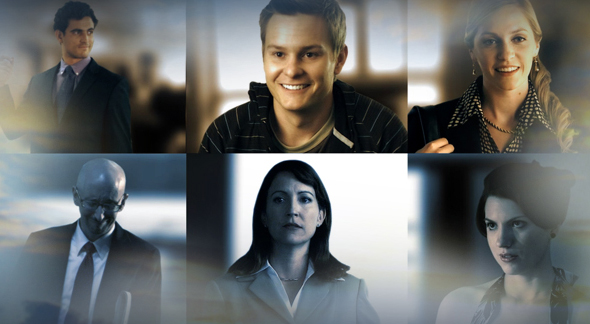
There are certain characteristics and mental attitudes which cause about 20 percent of a race to oppose violently any betterment activity or group.
Such people are known to have antisocial tendencies.
When the legal or political structure of a country becomes such as to favor such personalities in positions of trust, then all the civilizing organizations of the country become suppressed and a barbarism of criminality and economic duress ensues.
Crime and criminal acts are perpetrated by antisocial personalities. Inmates of institutions commonly trace their state back to contact with such personalities.
Thus, in the fields of government, police activities and mental health, to name a few, we see that it is important to be able to detect and isolate this personality type so as to protect society and individuals from the destructive consequences attendant upon letting such have free rein to injure others.
As they only comprise 20 percent of the population and as only 2 1/2 percent are truly dangerous, we see that with a very small amount of effort we could considerably better the state of society.
Well-known, even stellar, examples of such a personality are, of course, Napoleon and Hitler. Dillinger, Pretty Boy Floyd, Christie and other famous criminals were well-known examples of the antisocial personality. But with such a cast of characters in history we neglect the less stellar examples and do not perceive that such personalities exist in current life, very common, often undetected.
When we trace the cause of a failing business, we will inevitably discover somewhere in its ranks the antisocial personality hard at work.
In families which are breaking up, we commonly find one or the other of the persons involved to have such a personality.
Where life has become rough and is failing, a careful review of the area by a trained observer will detect one or more such personalities at work.
As there are 80 percent of us trying to get along and only 20 percent trying to prevent us, our lives would be much easier to live were we well informed as to the exact manifestations of such a personality. Thus, we could detect it and save ourselves much failure and heartbreak.
It is important then to examine and list the attributes of the antisocial personality. Influencing as it does the daily lives of so many, it well behooves decent people to become better informed on this subject.
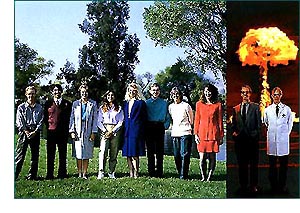
A relatively small proportion of a race, about 20 percent, possess antisocial characteristics. They cause trouble for the remaining 80 percent out of proportion to their number.
Attributes
The antisocial personality has the following attributes:
1. He or she speaks only in very broad generalities. “They say...” “Everybody thinks...” “Everyone knows...” and such expressions are in continual use, particularly when imparting rumor. When asked, “Who is everybody...” it normally turns out to be one source and from this source the antisocial person has manufactured what he or she pretends is the whole opinion of the whole society.
This is natural to them since to them all society is a large hostile generality, against the antisocial in particular.
2. Such a person deals mainly in bad news, critical or hostile remarks, invalidation and general suppression.
“Gossip” or “bearer of evil tidings” or “rumormonger” once described such persons.
It is notable that there is no good news or complimentary remark passed on by such a person.
3. The antisocial personality alters, to worsen, communication when he or she relays a message or news. Good news is stopped and only bad news, often embellished, is passed along.
Such a person also pretends to pass on “bad news” which is in actual fact invented.
4. A characteristic, and one of the sad things about an antisocial personality, is that it does not respond to treatment or reform.
5. Surrounding such a personality we find cowed or ill associates or friends who, when not driven actually insane, are yet behaving in a crippled manner in life, failing, not succeeding.
Such people make trouble for others.
When treated or educated, the near associate of the antisocial personality has no stability of gain but promptly relapses or loses his advantages of knowledge, being under the suppressive influence of the other.
Physically treated, such associates commonly do not recover in the expected time but worsen and have poor convalescences.
It is quite useless to treat or help or train such persons so long as they remain under the influence of the antisocial connection.
The largest number of insane are insane because of such antisocial connections and do not recover easily for the same reason.
Unjustly we seldom see the antisocial personality actually in an institution. Only his “friends” and family are there.
6. The antisocial personality habitually selects the wrong target.
If a tire is flat from driving over nails, he or she curses a companion or a noncausative source of the trouble. If the radio next door is too loud, he or she kicks the cat.
If A is the obvious cause, the antisocial personality inevitably blames B or C or D.
7. The antisocial cannot finish a cycle of action. Any action goes through a sequence wherein the action is begun, is continued for as long as is required and is completed as planned. In Scientology, this is called a cycle of action.
The antisocial becomes surrounded with incomplete projects.
8. Many antisocial persons will freely confess to the most alarming crimes when forced to do so, but will have no faintest sense of responsibility for them.
Their actions have little or nothing to do with their own volition. Things “just happened.”
They have no sense of correct causation and particularly cannot feel any sense of remorse or shame therefore.
9. The antisocial personality supports only destructive groups and rages against and attacks any constructive or betterment group.
10. This type of personality approves only of destructive actions and fights against constructive or helpful actions or activities.
The artist in particular is often found as a magnet for persons with antisocial personalities who see in his art something which must be destroyed and covertly, “as a friend,” proceed to try.
11. Helping others is an activity which drives the antisocial personality nearly berserk. Activities, however, which destroy in the name of help are closely supported.
12. The antisocial personality has a bad sense of property and conceives that the idea that anyone owns anything is a pretense, made up to fool people. Nothing is ever really owned.
The Basic Reason
The basic reason the antisocial personality behaves as he or she does lies in a hidden terror of others.
To such a person every other being is an enemy, an enemy to be covertly or overtly destroyed.
The fixation is that survival itself depends on “keeping others down” or “keeping people ignorant.”
If anyone were to promise to make others stronger or brighter, the antisocial personality suffers the utmost agony of personal danger.
They reason that if they are in this much trouble with people around them weak or stupid, they would perish should anyone become strong or bright.
Such a person has no trust to a point of terror. This is usually masked and unrevealed.
When such a personality goes insane, the world is full of Martians or the FBI and each person met is really a Martian or FBI agent.
But the bulk of such people exhibit no outward signs of insanity. They appear quite rational. They can be very convincing.
However, the list given above consists of things which such a personality cannot detect in himself or herself. This is so true that if you thought you found yourself in one of the above, you most certainly are not antisocial. Self-criticism is a luxury the antisocial cannot afford. They must be right because they are in continual danger in their own estimation. If you proved one wrong, you might even send him or her into a severe illness.
Only the sane, well-balanced person tries to correct his conduct.
Relief
If you were to weed out of your past by proper search and discovery those antisocial persons you have known and if you then disconnected, you might experience great relief.
Similarly, if society were to recognize this personality type as a sick being as they now isolate people with smallpox, both social and economic recoveries could occur.
Things are not likely to get much better so long as 20 percent of the population is permitted to dominate and injure the lives and enterprise of the remaining 80 percent.
As majority rule is the political manner of the day, so should majority sanity express itself in our daily lives without the interference and destruction of the socially unwell.
The pity of it is, they will not permit themselves to be helped and would not respond to treatment if help were attempted.
An understanding and ability to recognize such personalities could bring a major change in society and our lives.
The antisocial personality has a hidden terror of others. All other people are enemies to be covertly or overtly destroyed. One sign of an antisocial personality is that he deals mainly in critical or hostile remarks, invalidation and general suppression.
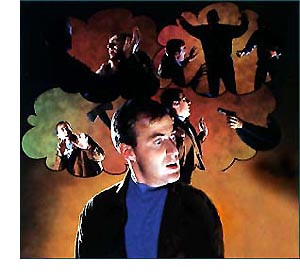
The antisocial personality has a hidden terror of others.
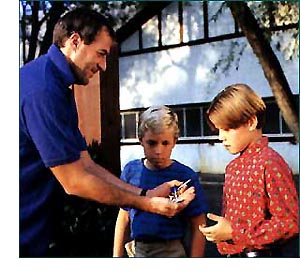
All the other people are enemies to be covertly or overtly destroyed.
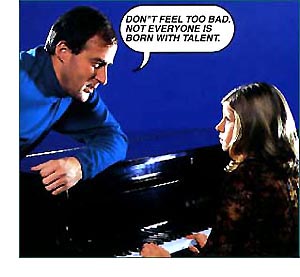
One sign of an antisocial personality is that he deals mainly in critical or hostile remarks, invalidation and general suppression.